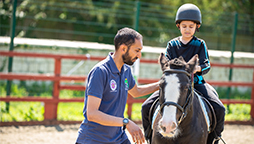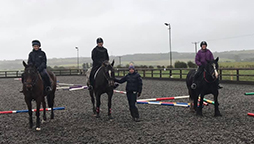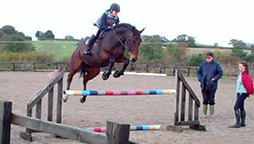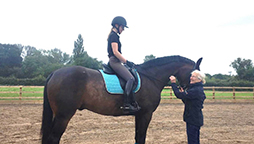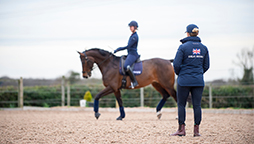Coaching teenagers
While some coaches will specialise in working with one particular participant group, others will work across several different groups over the course of their coaching. The coaches featured on this page are just some of those who work with teenage riders of all ages, from learning to ride to riding for please, training and competing outside of talent programmes.
Quick jump to a coach's profile
Jill Martin
Amelia Morris-Payne
Claire Nixon-Ord
Jane Randall
Jill Martin
What are your coaching qualifications?
UKCC Level 3 (British Showjumping and BHS), BETCM, IGEQ 3
WHAT ARE THE MAIN PARTICIPANT GROUPS THAT YOU COACH?
- Teenagers of all abilities
- Adult competitive riders
- Performance development riders
DO YOU HAVE A SPECIALTY or a favourite aspect of coaching?
Flatwork to improve jumping performance.
What inspired you to start coaching?
The wonderful role-models I've encountered during my own equestrian journey.
What’s your proudest coaching moment?
Being the trainer for a team that competed and won at Hickstead.
How would you encapsulate your approach to coaching?
Adaptive, inclusive and non-judgemental. I want to provide a safe, welcoming learning environment for those I coach, with realistic, regularly reviewed learning goals that are tailored to the individual.
Have you had to adapt your coaching over the past six months? Do you think it's has made you a better coach?
I've spent time exploring and improving my knowledge, joining cross-sport coaching seminars and working my way through an extensive reading list.
Do you have a piece of coaching wisdom that you feel most riders could benefit from?
Recognise the reasons that motivate you to ride, and attend to your own fitness and diet as diligently as that of your horse. Also, importantly, enjoy your sport.
What advice do you have for somebody looking for a coach to learn from?
First and foremost, choose a coach who is approachable and kind – remember that you will be investing a lot of money in your coaching sessions. Appropriate qualifications and insurance are essential, too. Be prepared to shop around, and book an assessment session initially to decide if the coach will be appropriate for you. Finally, when you find the right coach, treasure them.
Amelia Morris-payne
WHAT ARE YOUR COACHING QUALIFICATIONS?
UKCC Level 3, NDPCE
WHAT ARE THE MAIN PARTICIPANT GROUPS THAT YOU COACH?
- Riders up to the age of 12 of all abilities
- Teenagers of all abilities
DO YOU HAVE A COACHING SPECIALTY or a favourite aspect of coaching?
I love coaching young riders of all ages, but I particularly enjoy working with riders towards gaining more confidence and knowledge in jumping, and focusing on achieving a good, balanced position to allow the horse to work from under you.
WHAT INSPIRED YOU TO START COACHING?
I started coaching at 16 years old and loved helping children with their ponies. I wanted to give back to the Pony Club and was encouraged and inspired by the officials and coaches in my local branch.
WHAT’S YOUR PROUDEST COACHING MOMENT?
I take great pride in the achievements of all my pupils, no matter how great or small, and seeing the young riders buzz with smiles on their faces always makes me happy. I have many proud coaching moments, but especially seeing a rider come into Pony Club needing lots of help and support, then seeing them go on to qualify and ride at the Pony Club Championships. Training riders to go from their E test to passing their A test is also wonderful.
HOW WOULD YOU ENCAPSULATE YOUR APPROACH TO COACHING?
I believe that progress for horse and rider is made through a step- by-step process and should be rider-focused, ensuring that each coaching session is well understood. I focus on the rider's position and knowledge of what they’re trying to achieve, then the horse and rider will develop together. This way, the partnership develops its own toolkit for success. I believe that correct riding repeated becomes second nature and, regardless of natural aptitude, riders can learn to ride well. I like to make my coaching both informative and fun, and believe learning should be a pleasure, not a chore or built around fear.
I believe there is much more to riding than simply staying on the horse and directing traffic. I want the rider to feel like they have not only mastered the art of horsemanship, but that they have also mastered skills that will have a positive impact on their life, such as self-respect, confidence, planning, commitment, and good relationship skills.
Have you had to adapt your coaching over the past six months? Do you think it's made you a better coach?
That last six months has given me time to focus on:
- Improving my teaching resources
- Developing new lesson plans
- Improving my IT skillls
- How best to deliver coaching in alternative or distanced ways to enable riders to continue their development while in lockdown
I have been providing some coaching online via videos, and have had networking and planning sessions with coaches and colleagues. I've also had time to reflect on my work and my own goals going forward, and to pursue other interests outside of work.
Once we restarted coaching, I have been working in smaller training groups and spent time working on flatwork and poles and cementing the fundamentals so the riders and ponies can regain fitness before going on to jumping. The riders have been excited to get out training again and everyone has worked really hard to make sessions COVID safe for the children, parents and coaches, and fully comply with the guidelines set out by our governing body.
DO YOU HAVE A PIECE OF WISDOM THAT YOU FEEL MOST RIDERS COULD BENEFIT FROM?
- You're better jumping 10cm smaller well for six weeks longer than badly jumping 10cm higher once.
- Don't be greedy with your horse, think of the bigger picture – little steps, not huge jumps. Confidence is an egg, so don’t drop it and crack the shell.
- Have realistic goals, and make sure the goals are yours, not anybody else's.
- Think of positives first
WHAT ADVICE DO YOU HAVE FOR SOMEBODY WHO’S LOOKING FOR A COACH TO LEARN FROM?
Success in coaching both beginners and advanced riders comes from a backbone of knowledge. Training sessions should be positive, patient, knowledgeable, honest, realistic, equal and constructive.
Claire Nixon-Ord
WHAT ARE YOUR COACHING QUALIFICATIONS?
UKCC Level 4, BHS Accredited Professional Coach with BHS Stage 5 Coach, BHS Stage 5 Care and Management and BHS II, Level 5 in Education and Training, and PGDip in Professional Sports Coaching Practice
WHAT ARE THE MAIN PARTICIPANT GROUPS THAT YOU COACH?
- Riders up to the age of 12 of all abilities
- Teenagers of all abilities
- Adult participation riders
- Adult competitive riders
DO YOU HAVE A COACHING SPECIALTY or a favourite aspect of coaching?
Youth coaching, including those with SEND (learning differences or 'gifts').
WHAT INSPIRED YOU TO START COACHING?
I originally wanted to continue eventing and showjumping, but when I was at college I decided that I really needed to have qualifications to fall back on, so I could still be involved with the equestrian world. When I was 19, I came home with my BHSAI (BHS Stage 3 Complete Coach in Horsemanship), although I still had to do 500 hours of teaching before I was fully qualified. I decided that there was no one else in the area who specialised in developing riders through correct training, so Swinhoe Farm Riding Centre was established in 2005.
WHAT’S YOUR PROUDEST COACHING MOMENT?
It's hard to choose, but my proudest moment is every time I'm coaching someone who doesn’t think they can do something, but then the lightbulb moment happens when everything just clicks. That is what keeps me ignited to keep coaching, when people achieve what they or others thought was the impossible.
HOW WOULD YOU ENCAPSULATE YOUR APPROACH TO COACHING?
It’s so important to remember to keep sessions fun, but also keep terminology simple so you don’t over complicate things. I like making sessions relatable – for example, for youth coaching I look for inspiration from Disney, then add in other skills such as maths or English. I like to work on developing strengths and improving weaknesses. I use timing and include opportunities to create 'golden gems', which adds value and vital learning.
Have you had to adapt your coaching over the past six months? Do you think it's made you a better coach?
Like everyone, I've had to dramatically adapt due to COVID-19. The situation has made me more accessible through online coaching courses, and I've realised that I want to have all of my exercises in something like a book or app because there's no point in me having all these ideas without sharing them – I want to leave a legacy to inspire the next generation of coaches and riders.
DO YOU HAVE A PIECE OF WISDOM THAT YOU FEEL MOST RIDERS COULD BENEFIT FROM?
To remember that you should compete as a way of testing your training. It’s not about the bling – instead, focus on investing in your training. Don’t compare yourself to others, do what’s right for you and focus on what you can control.
WHAT ADVICE DO YOU HAVE FOR SOMEBODY WHO’S LOOKING FOR A COACH TO LEARN FROM?
Make sure you're in the right positive, supportive coaching environment to help you grow and achieve your goals.
Jane Randall 
WHAT ARE YOUR COACHING QUALIFICATIONS?
UKCC Level 4, British Dressage Youth Coach and Assessor
WHAT ARE THE MAIN PARTICIPANT GROUPS THAT YOU COACH?
- Teenagers of all abilities
- Adult participation riders
- Adult competitive riders
DO YOU HAVE A COACHING SPECIALTY or a favourite aspect of coaching?
I really like coaching adult participant and competitive riders because many of them sacrifice so much to ride and compete their horses. I meet so many talented people who are so confident and have achieved so much in their business and personal lives, and were often unable to ride as a child. Horses are great levelers and bring so many different challenges to them each journey is different. I'm finding it so difficult to say which is a favourite – I learn so much from teenagers too! Their ability to think outside the box and their sense of fun is great.
WHAT INSPIRED YOU TO START COACHING?
I started riding again after a long break, and previously I'd always been competitive and not a bad rider. My coach recognised my ambition and never once said it was not possible, and I was able to go on and compete internationally. From this, people asked me occasionally for lessons and I realised how much I loved it, so I wanted to give back in the way I had been coached.
WHAT’S YOUR PROUDEST COACHING MOMENT?
There are too many and they are always the little moments, such as when a rider takes on something we've been working on and makes it their own. Some of those moments are:
- When a teenage Pony Club member, upon being shown an exercise at camp, turned around and said, "Yes Jane, but what about doing it like this!"
- When I coached a disabled lady who found it difficult to walk. Her ability changed daily, so coaching her and working out which legs were working and how she could ride that day was very humbling. I was so proud of her gutsy determination, and when she got off the horse she could almost skip to her car.
The rosettes and prizes are great to hear about, but it is these little moments I treasure most.
HOW WOULD YOU ENCAPSULATE YOUR APPROACH TO COACHING?
My job is to do myself out of a job! If I can guide riders and give them the tools to take responsibility for their riding and training of their horses, then I'm happy. Ultimately, I become a mentor and sounding block for their own riding approach. I like to get to know the rider and find out who they are, then look at the whole picture and work with them to find the best way forward for them.
Have you had to adapt your coaching over the past six months? Do you think it's made you a better coach?
I got caught up in lockdown in New Zealand, so initially I felt very helpless and long way from my home, clients and horses. Like many other coaches, though, I have discovered the power of Zoom and have continued with my coaching. This has included off-horse performance conversations, working with riders to analyse how they could utilise this time in the best way for them. They initially sent videos for me to help them and this continued with real time on- horse coaching sessions (with all the correct safety and insurance permissions). We all worked together to maintain our relationships and move forward in the ways that were best for each individual.
I have been unable to coach professionally in New Zealand, so I volunteered my time to the Wanaka and Hawea Pony Club and have been mentoring one of their young coaches. It's been wonderful to see how it is for equestrians over here and I have made some lifelong connections. The horse management here is different and I'm coming home with some new ideas to take into my coaching life.
When at home I facilitate a Community of Practice for Equestrian Coaches, which I have continued to do via monthly Zoom calls. This has enabled us to share practice during the dilemmas of the COVID-19 pandemic, which has been good for all our riders. This community has also enabled us to continue with our own learning, and we have taken the opportunity to invite some amazing coaches to talk to us, which may not have happened in normal times. Everyone has supported each other.
I have also taken this time to finish my PGDip in Professional Practice in Sports Coaching, and mentor a young coach towards my qualification as a work-based mentor. I believe in lifelong learning, and these strange times have actually helped me reflect and develop my own coaching.
DO YOU HAVE A PIECE OF WISDOM THAT YOU FEEL MOST RIDERS COULD BENEFIT FROM?
A good coach will have spent many hours learning their craft. Please respect your coach as a professional. Take time to find out who they are and what their coaching philosophy is, and have frank, open discussions about what you and your horse need.
WHAT ADVICE DO YOU HAVE FOR SOMEBODY WHO’S LOOKING FOR A COACH TO LEARN FROM?
Take the time to talk to a prospective coach before having a mounted session. Ask them to tell you about themselves and their coaching philosophy, and they should question you, too. Be clear about what you and the coach expect from your relationship and what the boundaries are (no midnight calls for advice!). If you're both agreed on what you expect from a relationship, then it stands the best chance of being successful. Not everyone will be right for you, but please just don’t disappear. Coaches have different specialties, so if they're good with children, then they'll expect that the child will move on because their needs change, and they will help you to do this. A great coach won’t mind that you may have had lessons with someone else, instead they'll be interested!
